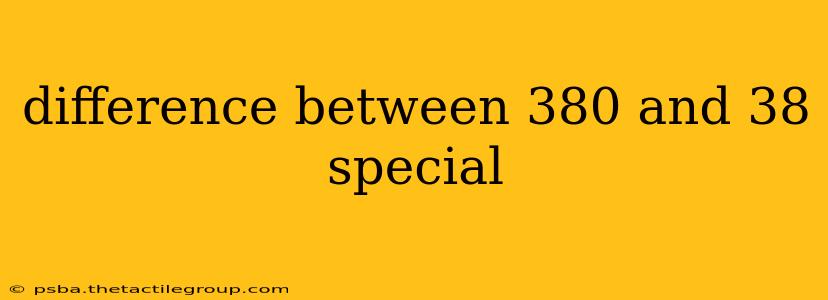Choosing the right cartridge for your handgun depends heavily on intended use and personal preference. Two popular choices often draw comparisons: the 9x17mm (.380 ACP) and the .38 Special. While both are centerfire pistol cartridges, their differences are significant enough to warrant careful consideration. This article delves into the key distinctions between the .380 ACP and .38 Special, exploring their ballistics, applications, and suitability for various users.
Ballistics: Power and Performance
The most significant difference lies in their ballistic performance. The .38 Special, a considerably older cartridge, packs a substantially more powerful punch.
.38 Special:
- Caliber: .38 inch (9.65 mm)
- Case Type: Rimmed
- Typical Muzzle Velocity: 750-900 fps (feet per second)
- Typical Muzzle Energy: 180-300 ft-lbs (foot-pounds)
This higher energy translates to greater stopping power and deeper penetration, making it suitable for self-defense and hunting small game. The rimmed case design is also noteworthy, influencing its functionality in revolvers.
.380 ACP (9x17mm):
- Caliber: .38 inch (9.65mm) — Note: Despite similar caliber measurements, the bullet diameter isn't the only difference affecting overall effectiveness.
- Case Type: Rimless
- Typical Muzzle Velocity: 900-1100 fps (depending on bullet weight and firearm)
- Typical Muzzle Energy: 150-240 ft-lbs
The .380 ACP, while still a viable self-defense round, offers less stopping power and penetration than the .38 Special. Its rimlesss case is designed for semi-automatic pistols, simplifying feeding and extraction. This velocity and energy are still within a range suitable for close range self-defense.
Recoil and Shootability
Recoil is a crucial aspect of handgun selection. The more powerful .38 Special generally exhibits more recoil than the .380 ACP, making it potentially less manageable for smaller-framed individuals or novice shooters. The .380 ACP is often considered easier to control and shoot accurately, especially during rapid fire.
Handgun Choices and Availability
The cartridge choice significantly influences the type of handgun you can use.
-
.38 Special: Primarily found in revolvers, although some semi-automatic pistols chamber this round exist, they are less common. The .38 Special's history makes it widely available, with a vast selection of ammunition types, from target loads to powerful self-defense rounds.
-
.380 ACP: This cartridge is almost exclusively used in semi-automatic pistols, offering a range of compact and lightweight designs making it popular for concealed carry. Ammunition availability is also high, although the variety of loads might not be as extensive as for the .38 Special.
Applications and Intended Use
The ideal choice depends heavily on the application.
-
Self-Defense: Both cartridges are suitable, but the .38 Special provides more stopping power. However, the .380's reduced recoil might be more beneficial for those who need a more easily controlled firearm for self-defense situations. The effectiveness of any cartridge depends highly on shot placement.
-
Target Shooting: Both are viable for target practice, with the .380 ACP often preferred for its lower cost and reduced recoil, especially for beginners.
-
Concealed Carry: The .380 ACP's smaller size and lighter recoil make it a favorite for concealed carry, allowing for smaller and lighter handguns.
Conclusion
The .380 ACP and .38 Special serve different purposes. The .38 Special offers superior stopping power and penetration but comes with stronger recoil. The .380 ACP prioritizes ease of handling, making it suitable for those prioritizing manageable recoil and smaller, concealable firearms. Ultimately, the best choice depends on individual needs, experience, and intended use. Consider factors like recoil tolerance, intended application, and firearm availability before making a decision.

